ARCHIVE – BC & NATIONAL Breaking News [Jan & Feb 2018]
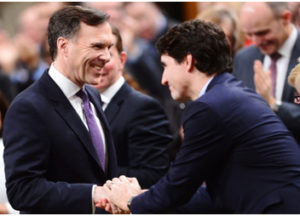
Billed largely as a budget to carry over to something more election-oriented in 2019, this 2018 Budget still makes good on several Liberal directions. The highest profile rollout was various approaches to gender equity in the workforce including more paid leave for the non-birth parent, along with support for innovation through funding in science and technology.
For the business community there was nothing particularly joyful, in a budget that held the course but did not offer the sort of tax cuts or investment incentives that businesses like to see. Even the capital support for women entrepreneurs is funneled through more backing for the Business Development Bank which isn’t for small startups; the rest of support for women entrepreneurs is the soft stuff — training, mentoring and networking.
The struggling newspaper industry may see some support, but in ways that push journalism into the non-profit sector. This could be seen as fallout for the bad corporate behaviour of some media giants that have spoiled it for smaller players. It also allows government to avoid any criticism for upset to larger newspapers in established markets. This limits real small business competition in the newspaper business.

The federal budget boasts that unemployment is at its lowest level in four decades, but that is true of almost every developed nation globally this year.
Overall, the Liberal theme of making life better for the middle class “and those working hard to join it” has enough life breathed into it in this budget to carry the Liberals into 2019 for what is likely a repeat performance on that theme in the 2019 election.
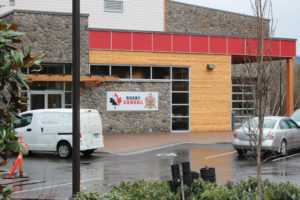
The new 2-storey, 1,900 sq m performance training centre will serve as the home to all of Rugby Canada’s national teams, as well support the training needs of other high performance amateur athletes in the region. It is seen as an economic generator for the west shore region.
The Centre represents the single largest investment ever made by Rugby Canada in its pursuit to grow the sport in Canada. Team operations are now centralized in Langford, in support of building international competitiveness.
Funding for the capital construction project included a federal government contribution of $2,935,250 through the Building Canada Fund – Major Infrastructure Component, as well as $2.5 million in repayable contributions from the City of Langford, along with over $2.6 million in private donations raised by Rugby Canada to date.
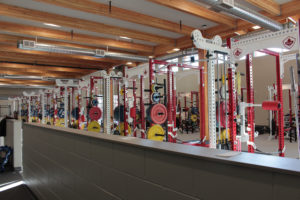
The Centre is located adjacent to Westhills Stadium, further complementing the enhanced resources available to Rugby Canada’s national teams. To build on the legacy of rugby in Canada, the facility will also feature the Rugby Canada Hall of Fame and Museum.
The Centre is now in active use by all of Rugby Canada’s national teams as they continue preparations for upcoming international competition.
Federal attention has been paid to this facility. “Infrastructure investments are all about communities and people, and we are proud to be supporting Canada’s amateur athletes through this new and improved high-calibre training facility,” says The Honourable Amarajeet Sohi, Minister of Infrastructure and Communities. The Al Charron Rugby Canada National Training Centre will be a major recreation hub for Vancouver Island, attracting even more visitors and tourists and providing new economic opportunities for residents. Projects like this help ensure Canadian communities remain among the best places in the world to live, work and raise a family,” he says.
Langford has been behind the training centre project right from the start. Says Langford Mayor Stew Young: “Langford is proud to be the home of Rugby Canada. From the installation of a World Rugby certified turf, to the construction of this high performance training facility, to the pending expansion of Westhills Stadium, Langford is committed to working with all levels of government and the development community to ensure that all high performance athletes have the resources they need to train right here in Langford.”
Mayor Young says the Al Charron Rugby Canada National Training Centre has been made possible by the hard work of so many people. He is pleased to see that the centre will not only serve as the home base for Rugby Canada athletes, coaches, trainers and management for many years to come, but will also support the training needs of other high performance athletes in the region.
Rugby Canada CEO Allen Vansen says: “It’s been incredible to see this world-class facility coming to life thanks to the dedicated support of the Government of Canada, the City of Langford, the Canadian rugby community, and the many contractors and service providers who have worked tirelessly to see this project through to its completion. It’s these strong partnerships that are creating an exciting future for the sport of rugby in Canada where our high-performance athletes of today and tomorrow, will have the resources and the facilities they need to achieve unprecedented success on the world stage.”
“A facility of this caliber is a game changer for those of us in the program right now, and for the generations of young players coming after us,” says Harry Jones, Canada’s Men’s Sevens Team Captain. This kind of support is hugely motivating, and we can all benefit from being together to learn from each other, and push each other to build an even stronger rugby culture that’s founded in honour and excellence.”
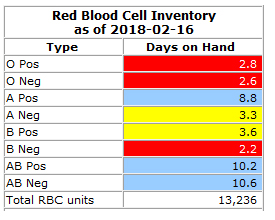
Three locations in the west shore now host regular blood donor clinics. Canadian Blood Services regularly sets up their mobile clinics at Church of the Advent in Colwood, at Royal Bay Secondary in the newest area of Colwood, and at the Sooke Legion.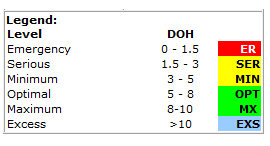
On BC Family Day, Monday February 12, the Sooke clinic saw a strong turnout. Of the 99 pre-booked donors, 85 attended, plus two walk-ins — and 56 re-booked for a future clinic. The target was to collect 67 units of blood… 69 were collected, a 103% success.
Supply Levels
- The need for blood and donors continues to be urgent. Inventory is at concerning levels after a difficult winter for collections. Winter interruptions include weather, flu, and the holiday season.
- “As a result, we’re asking 35,000 donors to step up across Canada to ensure we continue to meet patient needs leading up to spring break,” says Ann Chabert, Canadian Blood Services Territory Manager for Vancouver Island and the Gulf Islands.
- “As partners in our work for Canadian hospital patients, we are encouraging people to come in to donate blood at any of our clinics,” Chabert says. Visit www.blood.ca to find out about clinic times and to book appointments, or call 1-888-2-DONATE.
- As of February 16, there was only a 2.8 day supply of the most common blood type, O+ (considered to be an emergency low level). Rarer blood types, including AB+ and AB-, had a 10+ day supply of red blood cell inventory (considered excess).
Upcoming Clinics
- The next local clinic is on Monday March 19 at Church of the Advent, 510 Mount View Ave in Colwood (12 noon to 7 pm). As of February 20, the donor target for that day was 101 units (1 unit/donor); about 72 available spots for that Westshore clinic are still available.
- Clinics after that date come up after Easter — on Mon April 9 at Sooke Legion, 6726 Eustace Rd 12:30-7:30pm (time changed from the previous 11:30am-6:30 pm), and on Mon April 23 at Royal Bay Secondary, 3500 Ryder Hesjedal Way (9am to 4pm).
The Royal Bay component
- In spring 2016, a large delegation of Royal Bay students attended the clinic at Church of the Advent. “It was so successful that the school decided to host a blood drive on site at their school,” says Chabert.
- In May 2017, Royal Bay hosted their first blood drive as part of their Graduation legacy. Grad student Jaimey Hamilton (a three-time cancer survivor and recipient of blood and stem cells) “inspired her peers and ultimately the entire school,” says Chabert.
- The public is welcome to attend the Royal Bay clinic. To book a spot, call 1-888-2-DONATE or go to www.blood.ca . Belmont Secondary students might participate in that blood drive and shuttle students from their school in Langford over to Royal Bay.
> Article first published in the February 23, 2018 print/PDF issue of West Shore Voice News.
>> Tables: Red Blood Cell Inventory in Canada as of Feb 16, 2018 – volumes and level of need [stats by Canadian Blood Services]
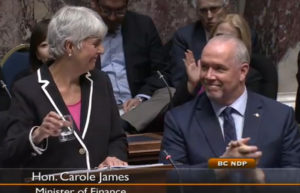
Eliminating Medical Services Plan premiums
Budget 2018 will eliminate Medical Services Plan (MSP) premiums, effective Jan. 1, 2020.
By eliminating these unfair and regressive fees, the BC government will help lift a significant financial burden off individuals and families. Eliminating MSP premiums will save individuals up to $900 per year and will save families up to $1,800 per year.
MSP premiums disproportionally affect low- and middle-income earners. Currently, all households with adjusted net income of more than $42,000 per year pay the same amount. This means a person earning $45,000 per year pays the same premiums as someone earning $250,000 per year. Eliminating this regressive fee for all British Columbians will result in a fairer tax system that works for everyone.
British Columbia is the only province in Canada that levies MSP premiums. They are complex and expensive for businesses to administer. They also lead to substantial administrative costs for government.
The BC government committed to eliminating MSP premiums within four years. The government took the first step in Budget 2017 Update by cutting MSP premiums by 50%, starting Jan. 1, 2018, and increasing the threshold for premium assistance by $2,000.
The decision to eliminate MSP premiums was informed by the MSP task force’s interim report, including the decision to eliminate premiums all at once, as opposed to phasing them out over time, and to provide advance notice of the changes.
In order to continue to deliver the services British Columbians depend on, the Province is replacing the revenues from MSP premiums with an employer health tax.
This new payroll tax will come into effect Jan. 1, 2019, with the following rate structure:
* Businesses with a payroll of more than $1.5 million, will pay a rate of 1.95% on their total payroll.
* Businesses with a payroll between $500,000 and $1.5 million, will pay a reduced tax rate.
* Businesses with a payroll under $500,000 will not pay the tax.
By exempting businesses with payrolls under $500,000, the employer health tax is designed to help protect small businesses. At 1.95%, it is the lowest rate among provinces with a payroll tax in Canada.
Further details about the employer health tax will be provided prior to its implementation on Jan. 1, 2019.
The Province estimates the new tax will raise approximately $463 million in 2018-19. The B.C. government will use this revenue to help people by investing in services and the economy.
* In 2016-17, MSP premiums provided a total of $2.6 billion in revenue.
* The new employer health tax is estimated to provide $1.9 billion in revenue per year in 2019-20 and 2020-21.
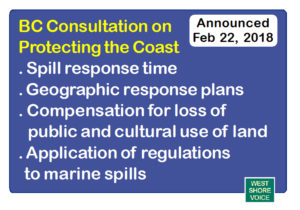 Thursday, February 22 ~ VICTORIA. Today Premier John Horgan outlined how the BC government will move forward on their action to protect the BC coast. It will start with consultation around four bitumen spill safeguards while at the same time referring to the courts the outstanding issue around BC’s right to protect BC’s coast, Premier John Horgan announced today.
Thursday, February 22 ~ VICTORIA. Today Premier John Horgan outlined how the BC government will move forward on their action to protect the BC coast. It will start with consultation around four bitumen spill safeguards while at the same time referring to the courts the outstanding issue around BC’s right to protect BC’s coast, Premier John Horgan announced today.
“We believe it is our right to take appropriate measures to protect our environment, economy and our coast from the drastic consequence of a diluted bitumen spill,” said Premier Horgan. “And we are prepared to confirm that right in the courts.”
“We’re proceeding with the four points that are not contentious. The fifth point we’re taking to legal counsel and will proceed in the days ahead,” Horgan announced to media this afternoon.
Consultations will begin soon on the “four remaining safeguards” as announced in January by Environment and Climate Change Minister George Heyman. Those are:
- Spill response time
- Geographic response plans
- Compensation for loss of public and cultural use of land
- Application of regulations to marine spills
Premier Horgan says his government will be retaining expert legal counsel to ready a reference to the courts, adding that it may take several weeks to bring the reference forward. This reference will seek to reinforce BC’s constitutional rights to defend against the risks of a bitumen spill.
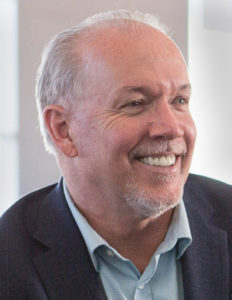 “I am absolutely hopeful that we can get back to a place where British Columbians and Albertans can share our common heritage which is our coast and our mountains and our streams,” Horgan told media today. “There are commonalities between our two provinces. And I would think all of us would want to get back to a place where we can enjoy the absolute privilege of being Canadians, and making sure that we all benefit from the distinctiveness of our individual provinces. That’s my objective, that’s been my objective from the beginning.”
“I am absolutely hopeful that we can get back to a place where British Columbians and Albertans can share our common heritage which is our coast and our mountains and our streams,” Horgan told media today. “There are commonalities between our two provinces. And I would think all of us would want to get back to a place where we can enjoy the absolute privilege of being Canadians, and making sure that we all benefit from the distinctiveness of our individual provinces. That’s my objective, that’s been my objective from the beginning.”
Horgan continued: “But I believe that the federal government and the government of Alberta do not understand the depth of feeling that the transport of diluted bitumen has on British Columbia. I’ve been quite clear about that. It’s not about Rachel Notley, it’s not about Justin Trudeau. It’s about the people of British Columbia and as the leader of the government I want to make sure I’m representing their interests.”
Horgan says the BC right to defend against the risks of a bitumen spill is a safeguard that has “generated disproportionate and unlawful reactions from the Alberta government, specifically their decision to ban the import of wines from British Columbia”.
“The actions by the Alberta government threaten an entire industry and the livelihoods of people who depend on it,” said Premier Horgan. “We have taken steps to protect our wine industry from the unwarranted trade action by the Government of Alberta.”
“It’s not about politics. It’s not about trade. It’s about British Columbians’ right to have their voices heard on this critical issue,” said Premier Horgan. “And it’s about BC’s right to defend itself against actions that may threaten our people, our province and our future.”
The premier said he intends for his government to continuing focussing on “things that matter to British Columbians”, itemizing from this week’s budget the focus on affordability, the housing crisis, and ensuring there are child care opportunities for families and a whole range of other issues. “That’s our preoccupation.”
“To have government of Alberta using these issues as tactics is not of any interest to me. I believe in the rule of law.
We’ve had one province and the federal government making suggestions that they know best, but we’re going to wait to hear from the courts,” Horgan said.

Throughout the approximately one-hour delivery, both Premier John Horgan and Finance Minister Carole James (a former leader of the BC NDP) appeared fully pleased, with beaming smiles, at the socially progressive accomplishments that the budget represents.
“Seven months ago, we were sworn in as a new government. It was clear in the election, as it is now, that British Columbians want a better BC,” Minister James began. “We live in a province rich in people, resources, natural beauty and opportunities. Yet those opportunities have become further and further out of reach for many,” she said.
“Families are working and can’t get ahead. Young people starting out can’t find affordable housing. And seniors can’t get the services they rely on. It’s time for a different approach. It’s time everyone in our province is part of our prosperity,” the Finance Minister said. She said that the budget is designed to “make life more affordable, improve the services you count on, and build a strong, sustainable economy that supports jobs in every corner of the province”.
Unlike budgets of the past, this new budget will look to injecting well-being into the society and economy on several levels, from which fresh new levels of prosperity can possibly evolve. This is in contrast to relying primarily on revenues from natural-resource industries and the speculative housing market.
The Opposition in a response from BC Liberal MLA Shirley Bond (Minister of Jobs, Tourism and Skills Training and Minister Responsible for Labour in the previous government), claims the NDP government will be spending more than generates in revenues and imposing tax increases on job creators to be “the biggest revenue generators”. Overall, the BC Liberal response sounded tired, hoping for a return of times past.
However, it is now-determined that the previous government under a BC Liberal majority bled the coffers of ICBC and increased BC Hydro rates on the backs of mostly those who could least afford it, and did not examine any ways to reduce or eliminate MSP fees until 2016 and only after pressure by the public and the NDP.
The NDP philosophy is generally to provide more supports and services to the broadest possible range of citizens. Even in business it is a known that ‘you need to spend money to make money’. When investments are astutely made in ways that will improve productivity of people and businesses and the well-being of communities, that in turn should pay off.
Actions to improve people’s health, ability to get to work (by supporting child care), improving affordability of housing and the flow of transportation for commuters, are socioeconomic infrastructure that can build a stronger future. doing nothing in those areas (or maintaining the previous status quo) was a recipe for continued economic hardship for many people in BC.
Waiting until there is an overflowing pot of funds is a pipe dream in any economic situation — from household and community, to business and in government. Aside from dolling out a few social program improvements toward the end of the 16-year BC Liberal run (which was based largely on increased property tax revenues from a booming real estate market) the working, low-income and many middle-income people of BC were slowly starved and suffocated of any real ways to remain financially stable let alone get ahead during the worst of the post-recessionary years. Not to mention an entire generation of children who – through education cutbacks during 2001-2016 — missed out on the best an education system can offer. In response to this, came the shift in power to the ‘progressive vote’ of 2017 that we see represented in the agreed-upon union of 41 NDP and 3 Green seats in the present legislature.
The present government is looking to the innovative economies to carry BC’s economy forward. That includes digital tech and green/clean tech, and also supporting that with stronger education initiatives (more money for teachers and schools, as well as training funding in post-secondary).
The Official Opposition is correct in effectively saying this is not what was done in the past. Moving toward the future requires some new thought, creative initiatives, and the courage to serve the people first.
It does seem a bit of stretch that the promised 114,000 new housing units promised by the NDP in the 2017 election campaign might in fact be hard to achieve. To date, 1,700 units have been initiated. Taking action against housing unaffordability is complex. “A piecemeal, reactive approach won’t work,” said Finance Minister Carole James in her speech today. She outlined, instead, a “comprehensive housing plan that commits to long-term solutions”.“It starts with taking action to stabilize the market and curb demand,” Minister James said.
“BC’s real estate market should not be used as a stock market. It should be used to provide safe and secure homes for families, renters, students and seniors,” James stated in her Budget 2018. Cracking down on speculators is a start, which is admirable but at least in the short term will hurt those with entry-level homes (seller or buyer) the most.
When it comes to foreign and domestic speculators, a new annual speculation tax will apply to property owners who don’t pay income tax in BC, including those who leave units vacant. “This is penalize people parking their capital in our housing market simply to speculate, driving up prices and removing rental stock.” The additional property transfer tax rate (foreign buyers tax) will increase to 20%. Currently applied only in Metro Vancouver, the tax is now extended to include the Capital Region, Nanaimo, Fraser Valley and Central Okanagan Regional Districts.
Homes valued over $3 million will be taxed more, with revenues there being targeted toward school funding.On the housing supply side “we are going to build the homes people need”. These homes will be a mix of housing for students, people with disabilities, seniors and families, and will range from supported social housing to market rental housing.
“We will also make significant investments to preserve and protect our existing social housing for the people already living in them. Our commitments will total more than $7 billion over the next 10 years. This will be the largest investment in housing in the history of our province, building almost 34,000 units across our province, including:• Units for mixed-income social housing,• New beds for students at colleges and universities, and• Units dedicated for people who are homeless.We know housing affordability can hit renters the hardest and many of our most vulnerable citizens are at risk. The 2018 budget boosts two rental assistance programs: Our Rental Assistance Program (RAP) and Shelter-Aid for Elderly Renters (SAFER).
The 114,000 affordable housing units “can only be done by building partnerships”, which the government aims to address and achieve through their new ‘HousingHub’ at BC Housing. The idea is to find, use or redevelop available land in communities hardest hit by the housing crisis. The idea is to partner with non-profits and faith-based organizations that have land.
Meanwhile, online accommodation providers will have to pay PST, municipal and regional district taxes, being bundled as a hotel room tax. Local governments will be able to use their hotel room tax revenue to build housing in their communities; this will make a difference in tourism-based communities where housing is seen in shortage.
James outlined that the “scale and complexity” of remedies for housing affordability challenges will not happen overnight. The aim is to “join with mayors, businesses and community leaders to speed up approvals and find ways to build more housing, faster”. The City of Langford’s approach to speedier development may well have been a model for this, as Premier Horgan has seen this up close in his riding of Langford-Juan de Fuca.
The present MSP system is easily seen to be skewed toward levying proportionally more revenue from low and middle income families. All MSP premiums will be eliminated effective January 1, 2020 (already being cut to 50% as of January 1, 2018). That will save families up to $1,800/year and individuals up to $900/year. Carole James announced an Employer Health Tax to replace MSP revenue. This will impact businesses with payrolls above $500,000 (a lower rate for businesses with payrolls $500,000 to $1.5 million, and a full rate for businesses with payroll over $1.5 million). Manitoba, Ontario, Quebec and Newfoundland have similar taxes. Ontario’s rate is 1.95% while the others are higher. The Opposition hit hard on that one, saying businesses are being asked to take on the burden of health care costs. The Finance Minister introduced her section on health care by saying “without your health, not much else matters”.
Read the full BC Budget 2018 speech.
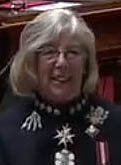
Tuesday, February 13. The BC Throne Speech this afternoon February 13 delivered in the BC Legislature laid out a preview of what can be expected in BC Budget 2018. Making life more affordable for British Columbians was the expected theme, seen strongly in directions for housing and child care.
“British Columbians have made their priorities clear. After years of rising living costs and stagnant wages, they expect government to make life more affordable,” said Lt Gov Judith Guichon in her introduction. “Too many British Columbians are working paycheque to paycheque. Many cannot pay the bills without going further into debt,” she said.
The Throne Speech is of course composed by the Premier and government of the day. The NDP directions for a social framework and economy that serves the broadest possible range of citizens was evident in the many initiatives that were introduced. Details will come in the Budget on February 20.
Today is was announced that more funds will be put toward training for early childhood education as a way toward increasing the number of licenced child care spaces. As Premier John Horgan explained afterward, this ultimately helps more women, as mothers, to get back into the work force to help boost family income and further their careers.
A creative approach to providing more lower-cost rental accommodation in larger cities is to build more accommodation for students on post-secondary campuses. This will free up a range of accommodations in housing in the general community for other low-income renters.
Further action on the effort to reduce the high cost of housing takes aim at speculation: “Government’s first step must be to address demand and stabilize BC’s out-of-control real estate and rental market. Safe, decent housing is a right that is under threat by speculators, domestic and foreign, who seek windfall profits at the expense of people who work, live and pay taxes in BC. We see the results of speculation in all parts of our province—distorted markets, sky-high prices and empty homes. Too many British Columbians are paying the price,” said Guichon in the Throne Speech.
Horgan spoke strongly in support of the forestry industry, saying that forestry is a 21st-century industry that can benefit from the application of advances in technology. There was absolutely no mention of LNG in the budget, which later BC Green Party Leader Andrew Weaver said was “refreshing” as LNG is “not profitable” in a world market that is glutted with natural gas (mentioning that the USA and Russia have ample supply of their own).
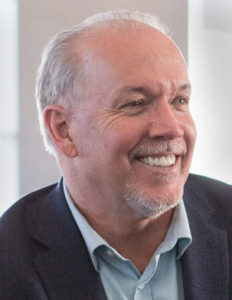
All references in today’s speech to fast-growing communities and transportation challenges were to the Lower Mainland, but oddly (as Langford-Juan de Fuca is the Premier’s own home riding) there was no mention about the west shore of Vancouver Island that is booming and in need of more housing, schools and transportation resolutions.
The BC NDP government says it is working toward a sustainable, diverse economy. “Your government’s vision for a fair and inclusive society will be built from the foundation of a healthy, growing economy, and from a clear understanding that we must create wealth in order to share it,” it was stated in the Throne Speech.
To media afterward, Premier Horgan reiterated his position about consulting with the people of BC as well as industry, communities and First Nations about the environmental protections that are needed to ensure protection of the environment in BC that is so entwined with the economy of this coastal province.
Horgan said he looks forward to “cooperative not coercive” actions between provinces. “All British Columbians want to see cooperative not coercive federalism. BC will continue to be cooperative equal partners in Canada,” said Horgan this afternoon.
 Monday, February 12 ~ BC. Today February 12 is BC Family Day, making for a 3-day long weekend. Pretty much everyone appreciates a day off in cold dreary February, mid-winter!
Monday, February 12 ~ BC. Today February 12 is BC Family Day, making for a 3-day long weekend. Pretty much everyone appreciates a day off in cold dreary February, mid-winter!
“BC Family Day is a day for people to spend time with their loved ones and join in community celebrations. To make sure Family Day events are accessible to everyone, the BC government has partnered with the BC Recreation and Parks Association to fund free family-friendly activities and events in communities around the province,” it was announced in a statement from Premier John Horgan this weekend.
Many rec centres in BC are offering special deals and admissions. Admission is free all day at SEAPARC Leisure Complex in Sooke today, within Horgan’s home riding of Langford-Juan de Fuca.
“It’s part of our commitment to make life better and more affordable for you and your family. Take some time today to have fun in your community, and have a happy BC Family Day!”
Starting next year, British Columbia’s Family Day will be moved to the third Monday in February “so families across the country can celebrate together”, it was announced by BC Premier John Horgan ahead of this Family Day long weekend.
Family Day was established in British Columbia in 2013 (several years after most provinces already had a Family Day in February) following a consultation process that had recommended the holiday be on either the second or third Monday of February. The government of the day decided on the second Monday, even though it was inconsistent with other Canadian provinces and the United States.
At the time, the main reason for choosing the second Monday of February was given as input from the winter sport industry, particularly the ski industry which appreciated packing in business from BC residents and locals, leaving room for Family Day visitors the following weekend from many other parts of Canada where Family Day is on the third Monday of February.
In announcing the change for 2019, Premier Horgan said Family Day will now be better aligned for businesses and families. “Moving Family Day is the right thing to do for businesses small and large, and is better for families who may be spread out across the country,” said Premier Horgan. “This gives families an opportunity to schedule and spend more time with loved ones from other provinces.”
“The misalignment of Family Day causes inconvenience, increased costs, and lost opportunity for businesses of all sizes and in various industries,” said Surrey Board of Trade CEO Anita Huberman. “The economic benefit from this change will greatly assist our members, and especially small- and medium-sized businesses, across the province.”

Friday, February 9 ~ BC. $105-million investment to make prescription medications more affordable for families starting 2019
The British Columbia government is eliminating PharmaCare deductibles for working families with the lowest incomes in the province, helping to make sure they get the prescription medicines they need but currently are struggling to afford, Health Minister Adrian Dix announced today. “It helps low income people and seniors,” said Dix.
“No parent should have to make the difficult decision between their family’s health and putting food on the table,” said Dix. “The investment we’re announcing today will make life more affordable for British Columbians, while making sure they get the care they need.”
“I am unbelievably enthusiastic. I think this is fantastic news,” said BC Health Minister Dix in a news teleconference today. “There has been remarkable work by the Ministry of Health,” he said.
Dix said the new changes are “consistent with our agreement with the Green Party”, saying the Green MLA Sonia Furstenau “contributed enormously to this project”.
“The costs of prescription drugs prevents too many British Columbians from addressing treatable conditions, saddling them and our healthcare system with the effects of untreated illnesses down the road,” said Furstenau in a release to media.
“Our caucus is very pleased that the government is making this investment in the health of British Columbians. Especially with so many communities facing an affordability crisis, this will go a long way to improving the lives of the people of BC,” said Furstenau.
The $105 million being invested in Fair PharmaCare over three years will eliminate or reduce the deductibles for 240,000 B.C. families. All families with household net incomes under $45,000 will benefit. Dix said the biggest impact will be felt by families with net annual incomes between $15,000 and $30,000. They will have no deductible, starting Jan. 1, 2019.
“This is a crucial step forward in improving the health and lives of thousands of British Columbians,” said Dix. “We know that in families earning under $30,000 in net income, needed prescriptions go unfilled too often because PharmaCare deductibles are too high. The step we’re taking today is a significant one, as deductibles have not been changed in 15 years.”
These will be the first changes to deductibles since 2003. Prior to these changes, Fair PharmaCare families faced relatively large jumps in their deductibles, as incomes increased past certain thresholds. Deductibles went from $0 to $300 when a family’s income reached $15,000 and jumped another $300, from $600 to $900, when a family’s net income reached $30,000.

Ministry of Health analysis indicates that these jumps are often accompanied by decreases in drug spending, suggesting that families are not filling prescriptions due to affordability. Families earning under $45,000 are also less likely to fill prescriptions, or make trade-offs with other essentials, like groceries, heat and housing.
Co-payments will also be eliminated for families with a family member aged 79 years and older with net incomes below $13,750, and lowered for all families with net incomes under $45,000.
“Prescription drugs don’t work if people can’t afford them,” said Dr. Michael Law, Canada research chair in access to medicines at the University of British Columbia. “Research shows that many people in this province have not filled or skipped prescriptions because of the cost, and these changes being announced will improve health outcomes by significantly increasing access to important and effective medicines.”
Thursday, February 8 ~ BC. British Columbia’s lowest-paid workers will earn a $15-an-hour minimum wage by June 2021, Premier John Horgan announced today, endorsing the recommendations of the Fair Wages Commission.
“Regular, predictable increases to our minimum wage are one important way we can make life more affordable for people,” said Premier Horgan.
“For too long, the lowest-paid workers in our province have been left to fall behind, with their wages frozen for a decade at a time. That’s not fair and it’s not right. Like all British Columbians, our lowest-paid workers deserve a fair shake and a fair wage.”
The plan to reach $15 an hour provides for an immediate increase of $1.30 an hour on June 1, 2018, to a new minimum wage of $12.65 an hour. Additional increases will take place on June 1 of each year for three more years. By June 2021, B.C.’s minimum wage will rise to at least $15.20 an hour. The four increases between 2018 and 2021 represent a 34% increase over four years.
The next wage increase, on June 1, 2018, will benefit 94,000 minimum-wage earners, while increasing the minimum wage to over $15 an hour on June 1, 2021, will benefit 400,000 workers throughout the province. The commission’s scaled approach will allow businesses and employers to plan for predictable and stable increases to wages over time.
“Freezing the minimum wage for 10 years hurt people, and then increasing it in a sporadic and unplanned way hurt businesses. We are taking a balanced approach that will work better for everyone, by bringing in measured and predictable increases over time,” said Harry Bains, Minister of Labour. “I’m thankful for the incredible work done by the members of the Fair Wages Commission, who worked together to come up with a fair path forward.”
The Fair Wages Commission was established in October 2017 as an arm’s-length government body to help guide public engagement on how B.C. should achieve a $15-an-hour minimum wage, and also the timeline for implementation. In a report delivered to government in January 2018, following public consultations and receipt of research and submissions, the commission recommended four minimum wage increases over four years.
The Fair Wages Commission recommended the following schedule of increases:
- * June 1, 2018: $12.65 an hour ($1.30 increase)
- * June 1, 2019: $13.85 ($1.20 increase)
- * June 1, 2020: $14.60 ($0.75 increase)
- * June 1, 2021: $15.20 ($0.60 increase)
Depending on economic conditions, the commission recommended that government consider of an additional hourly increase of up to $.20, to $15.40 an hour in 2021. The Fair Wages Commission report with recommendations can be found here: https://engage.gov.bc.ca/app/uploads/sites/237/2018/02/Report-1_BC-Fair-Wages-Commission_Jan-2018.pdf
The minimum wage was initiated in BC in 1918. The current minimum wage is $11.35 an hour, and applies to 4.8% of employees in BC. Over 20% of all workers in BC earn less than $15 an hour.
Of workers earning less than $15 an hour, 52% are over age 25, more than three-quarters are not students, 61% are in coupled families, and over 51% have gone to college/university. 46% of minimum-wage earners work for small firms (under 100 staff), while 54% work for large employers.
BC has the lowest unemployment rate in Canada, the strongest job growth and a rising labour force participation rate. Total employment rose by 3.6% in 2017, twice the national pace. Private sector hiring is particularly strong, growing 4.4% last year. Yet, BC is a low-wage province and average wages are below the national average.

Wednesday, February 7 ~ VICTORIA. BC & ALBERTA – consultation vs goading.
In response to a stream of media questions on the topic, Premier John Horgan used up pretty much all of his 15-minute news conference from the BC Legislature today February 7 battling off questions about essentially what he is treating as pesky interference by Alberta Premier Rachel Notley in her impassioned guerrilla-style defense of the Alberta oil industry.
Horgan reminded the media that he intends to continue focusing on the broad needs of British Columbians, particularly around ways to integrate affordability into the socioeconomics of this province.
Horgan said that Agriculture Minister Lana Popham has been in discussions with the BC wine industry growers in the Okanagan and that top officials in government are actively “exchanging notes and phone calls” to keep channels open. But that the Premier himself will “not be distracted”.
“I would hope we’ve seen the end of the back and forth. I deliberately wasn’t available to you (media) yesterday because it’s not in anyone’s interest to having dueling premiers,” said John Horgan. He noted that BC and Alberta share a political flag “but that’s secondary to my obligations to the people of BC”, Horgan said, adding: “What Alberta does is entirely up to them.”
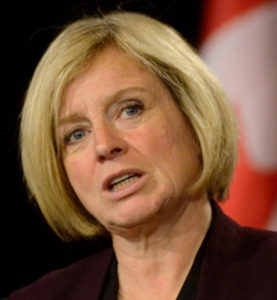
Horgan reiterated that BC will be engaging with stakeholders, First Nations, and the people of BC as part of establishing some environmental protections in the case of an oil spill. BC is still in federal court about the need to ensure environmental protections before the TransMountain pipeline proceeds.
In today’s media conference, Horgan said he didn’t appreciate that one jurisdiction would goad another to take action against a third jurisdiction. And defending BC getting organized to consult British Columbians: “Consulting is not provocative,” he said, adding that it is his “right to consult with British Columbians about putting in place protections for environment and economy”
“I will defend our wine industry. I’m here for BC, not Alberta,” said the Premier.
Tuesday, February 6 ~ VICTORIA. BC Green Party Leader had a supportive response to the BC NDP Government’s release of changes to ICBC policy.
“I am encouraged that the government is putting British Columbians’ health outcomes at the centre of these policy changes,” said Weaver. ” These changes mean that a larger share of our public insurance funds will go directly towards helping British Columbians who suffer accidents recover from their injuries.”
“A successful, affordable public insurance system requires government to act in the best interests of the people who participate in it. The B.C. Liberals betrayed the trust of British Columbians when they pillaged ICBC’s capital reserves, and ignored and concealed the evidence-based recommendations put forth by their own consultants. The mess left behind by the Liberals’ reckless fiscal mismanagement necessitates major changes, and I’m glad that the current government is taking this seriously.
“I look forward to seeing the proposed changes to the rate structures, but am encouraged that the Attorney General has signaled a move towards a fairer model that rewards good drivers while ensuring bad drivers pay their fair share based on risk.”
Tuesday, February 6 ~ VICTORIA. Today the BC NDP Government announced several changes to tackle both the financial challenges and service delivery model of the Insurance Corporation of BC (ICBC).
“Together, these changes will reduce the amount ICBC spends on legal fees and expenses, which have grown to consume 24% of ICBC’s budget,” said Attorney General David Eby in a media announcement today.
“The savings from this change, when coupled with other planned initiatives, will restore ICBC to financial sustainability and finance the planned accident benefit improvements.”
The changes come in the wake of multiple revelations about decisions and inaction by the previous government, leading to ICBC projecting a 2017-2018 net loss of $1.3 billion. BC drivers could face premium increases averaging $400 or more, if no action is taken, it was stated in a news release.
Disputes over certain motor vehicle injury claims, including the classification of an injury, will be adjudicated by BC’s Civil Resolution Tribunal (CRT), an independent body that already adjudicates strata and small claims disputes in the province.
“For too long, difficult decisions have been put off and growing financial problems at ICBC hidden from the public. The changes we’re initiating today will reduce ICBC’s claims costs by more than $1 billion every year, helping make it sustainable for decades to come,” Eby said.
Taking effect April 1, 2019, the changes include:
- A new limit of $5,500 on pain and suffering for minor injury claims. The cost of those claims has increased 265% since 2000. British Columbia is the last province in Canada to take this kind of action.
- The first major improvements in accident benefits in 25 years, dramatically increasing the care available for anyone injured in a crash, regardless of fault. The overall medical care and recovery cost allowance will be doubled to $300,000. This change will be made retroactive to Jan. 1, 2018, so it will effectively be in place to protect injured drivers and passengers immediately. See more on this benefit below.
- An independent dispute resolution process for certain motor vehicle injury claims.
“British Columbians can no longer afford to keep paying more and more for their auto insurance every year, and this is the decisive and immediate action which is needed to relieve the pressure on ICBC’s rates,” said Joy MacPhail, chair, ICBC board of directors. “These changes make the injured customer our top priority, by redirecting payments away from legal costs into significantly enhancing the care and treatments for anyone who is injured in a crash.”
Accident benefit details:
- Doubling the lifetime allowance for medical care and recovery costs for those catastrophically injured in a car accident from $150,000 to $300,000. Legislation will be introduced with the intention of making this benefit retroactive to Jan. 1, 2018, in order to start immediately helping seriously injured British Columbians.
- Covering a greater variety of treatment services.
- Significantly increasing the amount covered for treatments, so customers don’t have to pay out-of-pocket.
- More than doubling wage loss payments to $740 per week, almost doubling home support benefits to $280 per week, tripling funeral cost coverage to $7,500, and increasing death benefits to $30,000.
In 2016, injury claims totalled $2.7 billion, an increase of 80% in seven years. The average claim paid out for minor injuries rose from $8,200 in the year 2000 to $30,038 in 2016 (increase of 265%). At the same time, the average pain and suffering awards paid out for minor injuries increased from $5,004 in 2000 to more than $16,499 in 2016.
Vehicle damage claims costs have increased 30% in just two years, to a total of $1.5 billion in 2016 alone.
Use of the Civil Resolution Tribunal (CRT) for minor injury dispute resolution means claimants who don’t use a lawyer will get to keep their entire settlement, rather than paying a portion of it toward lawyer’s fees.
The use of the CRT for these disputes will also reduce ICBC’s legal costs, which account for 24% of the corporation’s total annual costs. These costs are greater than the cost of running ICBC, the government revealed today.
 Monday, February 5 ~ VICTORIA, BC. The following is the BC government’s new release about Cannabis retail, driving laws among new firm-on-safety policy decisions
Monday, February 5 ~ VICTORIA, BC. The following is the BC government’s new release about Cannabis retail, driving laws among new firm-on-safety policy decisions
As British Columbia works towards the federal timeline for legalization of non-medical cannabis in July 2018, the Province continues to set policy direction to meet the needs and expectations of British Columbians.
“As a result of months of engagement, additional research and analysis, we continue to build the Province’s regulatory framework and have set policy direction on other key aspects of how non-medical cannabis will be regulated in B.C.,” said Mike Farnworth, Minister of Public Safety and Solicitor General. “These decisions include safeguards for the retail sales of non-medical cannabis and are driven by our priorities of protecting youth, promoting health and safety, keeping the criminal element out of cannabis and keeping our roads safe.”
The following decisions will inform the development of legislation in preparation for federal legalization of non-medical cannabis in July.
Retail framework
As was announced in December 2017, government is releasing details on the Province’s proposed retail framework. British Columbians of legal age will be able to purchase non-medical cannabis through privately run retail stores or government-operated retail stores and government online sales. B.C.’s Liquor Distribution Branch (LDB) will operate a new standalone network of public retail stores and the Liquor Control and Licensing Branch (LCLB) will be responsible for licensing private stores and monitoring the retail sector.
The operating rules governing public and private retail stores will be similar to those currently in place for liquor. However, to promote responsible use, licensed retailers will not be able to sell cannabis in the same stores as liquor or tobacco. In urban areas, licensed retailers will only be allowed to sell cannabis and cannabis accessories, and will be prohibited from selling other products, such as food, gas, clothing and lottery.
The B.C. government recognizes that retail access for people in rural areas will require a different approach than those used in urban communities and will establish exceptions for rural non-medical cannabis retail stores, similar to those of rural liquor stores. The criteria for determining these rural areas are currently under development.
This spring, the Province will launch an early registration process for individuals and businesses who are interested in applying for a cannabis retail licence. Although B.C. will not cap the number of retail licences available, licences will not be issued without the support of local governments, which will have the authority to make local decisions, based on the needs of their communities.
Additional details on the retail framework, including frequently asked questions for potential applicants, are available at: https://news.gov.bc.ca/files/Cannabis_Private_Retail_Licensing_Guide.pdf
Personal public possession limits
Adults aged 19 years and older will be allowed to possess up to 30 grams of non-medical cannabis in a public place, which aligns with the federal government’s proposed possession limit for adults.
Those under the legal age of 19 years will be prohibited from possessing any amount of non-medical cannabis. Additionally, cannabis transported in a motor vehicle will need to be in a sealed package, or inaccessible to vehicle occupants.
Places of use
B.C. will generally allow adults to use non-medical cannabis in public spaces where tobacco smoking and vaping are permitted. However, to minimize child and youth exposure, smoking and vaping of non-medical cannabis will be banned in areas frequented by children, including community beaches, parks and playgrounds. Use of cannabis in any form will also be banned for all occupants in vehicles.
Local governments will be able to set additional restrictions, as they do now for tobacco use. In addition, landlords and strata councils will be able to restrict or prohibit non-medical cannabis smoking and vaping at tenanted and strata properties.
Personal cultivation
B.C. will align with the proposed federal legislation and allow adults to grow up to four cannabis plants per household, but the plants must not be visible from public spaces off the property. Home cultivation of non-medical cannabis will be banned in dwellings used as day cares. In addition, landlords and strata councils will be able restrict or prohibit home cultivation.
Drug-impaired driving
Drug-impaired driving will continue to be illegal and B.C. will increase training for law enforcement in this area. B.C. will also toughen provincial regulations to give police more tools to remove drug-impaired drivers from the road and deter drug-affected driving, including:
* B.C. will create a new 90-day administrative driving prohibition (ADP) for drug-affected driving; and
* The current zero-tolerance restrictions for the presence of alcohol for drivers in the Graduated Licensing Program (GLP) will be expanded to include zero tolerance for the presence of THC, the active ingredient in cannabis.
“National legalization of non-medical cannabis represents an historic shift in public policy. This provincial regulatory framework provides a sound foundation to support the provincial goals that prioritize public health and safety,” Farnworth said. “That said, July 2018 is only the beginning of our journey, and these changes will not happen overnight. We fully anticipate all levels of government will need to continue to assess and refine cannabis policy and regulation in the months and years to come.”
In December 2017, the Province announced that British Columbia’s minimum age to possess, purchase and consume non-medical cannabis will be 19 years old, and that the LDB will be the wholesale distributor of non-medical cannabis in B.C.
Government plans to introduce legislation in the spring legislative session to affect these policy decisions. It will also launch a public education campaign to ensure broad public awareness of the provincial rules before they come into force. For more detailed information, please visit: https://www2.gov.bc.ca/gov/content/safety/public-safety/cannabis
Learn More:
The draft federal Cannabis Act (Bill C-45): http://www.parl.ca/LegisInfo/BillDetails.aspx?billId=8886269
B.C.’s cannabis public engagement: http://engage.gov.bc.ca/BCcannabisregulation/
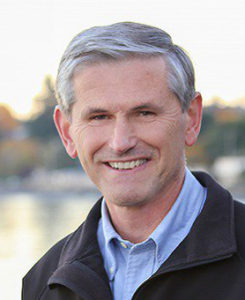
Sunday, February 4 ~ VICTORIA. Andrew Wilkinson has been chosen by the BC Liberal Party membership as their new leader.
The BC Liberal Party has operated with an interim leader (Rich Coleman) since former Premier Christy Clark resigned August 4 last year following the power shift to a progressive minority government a try under the NDP’s John Horgan.
A slate of six BC Liberal candidates vyed for their party’s top job, with the membership on February 3 choosing the relatively new Vancouver-based MLA Andrew Wilkinson (first elected in 2013 and served as the minister for Advanced Education and also Technology, Innovation and Citizens’ Services).
It is interesting that the more celebrity-style candidates who made a vibrant mark with outgoing moves during the Clark era — Mike de Jong and Todd Stone — came in fourth and fifth respectively.
Wilkinson grew up in Kamloops, and earned his higher education as a medical doctor at the University of Alberta, followed by law degrees at Oxford and Dalhousie.
Prompt congratulations were issued by Green Party Leader Andrew Weaver, adding: “One of our caucus’ key priorities in choosing a confidence and supply agreement over a coalition government was to ensure we could work with both parties to advance our shared priorities in the legislature.”
On behalf of the BC NDP, Ravi Kahlon, MLA (Delta North) issued congratulations to new BC Liberal leader Andrew Wilkinson. In a late-evening news release, the NDP said: “Right now, the stakes couldn’t be higher for British Columbians. People are counting on (the NDP) to make life more affordable, protect the services they count on and keep investing in a sustainable economy,” said Kahlon. “Our government has made great strides towards these goals, but major challenges—like the dumpster fire at ICBC — still remain”.
Sunday, February 4 ~ SOUTH VANCOUVER ISLAND. There was a small earthquake at 10:57 pm on south Vancouver Island last night, Saturday February 3. First called a 2.7 quake by Natural Resources Canada Geological Survey of Canada, then upgraded to 2.8 Magnitude, there were no reports of damage, and none would be expected. The quake occurred at 19 km east of Sidney where it was lightly felt, as well as being felt throughout the Saanich Peninsula, Victoria, and Sooke.
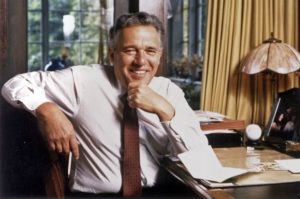
Saturday, February 3 ~ VICTORIA. “Today, BC has lost a giant, former premier Dave Barrett,” said Premier BC John Horgan in a statement released late Friday afternoon, February 2.
Barrett, who led an NDP government 1972 to 1975 died February 2 at age 87. His health deteriorated in his later years due to Alzheimer’s.
Barrett led BC’s first NDP government, busting out of office a 20-year centre-right Social-Credit government. “His visionary leadership and unflinching commitment to the well-being of ordinary people around the province led to lasting change that shaped our province for the better. In just one short term, his government delivered our first modern ambulance service, the Agricultural Land Reserve and public auto insurance. We are all better off, thanks to his tireless work and immeasurable contributions to public life,” said Premier Horgan.
Horgan said that Barrett’s sense of humour and ability to command a room with his oratory was legendary. “First and foremost, I will always remember his commitment to working for regular people.”
“He was an inspiration to me and many other British Columbians, and I am grateful for his friendship and guidance over the years. His legacy will live on in our hearts,” said Horgan. Since taking the reins of the first NDP government in 16 years in BC last July, Horgan seems to have taken a page from the Barrett book of politics by getting many initiatives in place right off the bat.
Back in 1972 Barrett took a bold path, writing in his 1995 memoir: “We agreed unanimously to strike while the iron was hot. Our government represented the first real break from the traditional power base of the province. We were free and unfettered to roam in new directions.”
Today BC Green Party leader Andrew Weaver said about Dave Barrett: “As Premier, he enacted bold, sweeping changes that touched on every aspect of life in BC. He has left a lasting imprint on our province. Many of the reforms enacted under his leadership are still with us today, including lasting protection to our agricultural land through the Agricultural Land Reserve, and Pharmacare.”
Barrett’s education minister at the time did away with corporal punishment in BC schools.
Thursday, February 1 ~ VANCOUVER ISLAND. The Dogwood Initiative in the south Vancouver Island area is organizing a bus for early in the morning on Friday, February 2 to take their supporters to Nanaimo to attend the town hall meeting that Prime Minister Justin Trudeau will be holding at 11 am.
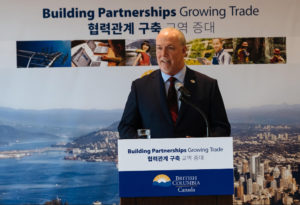
Saturday, January 27 ~ BC. BC Premier John Horgan says what’s impacted him most so far on his 10-day economic development trip to three countries in Asia is “the staggering magnitude and scale of China… to see it first hand – the traffic, people, air quality.”
With enthusiasm, addressing media by phone on Friday January 26: “These are real opportunities for the clean tech sector. (Canada is) a small player on the international stage compared to China.”
Horgan’s trip that includes urban stops in Beijing, China, in Seoul, South Korea (where he toured a new tech hub that popped up over the last 10 years), and Tokyo, Japan is about “job creation and investment for BC”.
He added: “This trip has shaped my perspective of the enormous potential for BC to diversity our trade.”
“Trade between BC and South Korea is important to our province’s economy, and ultimately job creation in BC,” said Premier Horgan in a news release today January 27. “We’re meeting face-to-face with our partners in South Korea to encourage further business relationships, and to strengthen the economic and cultural ties we already share.”
Premier Horgan and Ralston also visited Netmarble, Korea’s largest social-gaming company. Netmarble confirmed that its Vancouver subsidiary, Kabam, will expand studio space to create new jobs in the growing BC tech sector.
One of the virtual partnerships of note was the launch of a BC agrifoods marketing prtomotion on the Korea-based Coupang e-commerce website. Coupang has the largest customer base in the South Korean e-commerce market, with more than 28 million users.
During the BC Partnerships luncheon, Premier Horgan helped launch the Coupang marketing promotion, where 23 BC agrifoods companies will list more than 100 products. The e-commerce market in South Korea was worth $41 billion in 2015, representing nearly 11% of total retail market share.
Another highlight of the trip to South Korea was the recognition of the 10th anniversary of the BC-Gyeonggi sister-province relationship. Gyeonggi is Korea’s leading technology province, and shares many mutual bilateral objectives with British Columbia. To support this relationship, Premier Horgan and Gyeonggi Governor Nam Kyung-pil have signed a renewed three-year economic action plan, enhancing co-operation in the areas of digital media, information and communications technology/wireless technology, agrifoods, wood products and low-carbon construction, and tourism.
Following the signing of the three-year action plan, a collaboration agreement was signed between DigiBC and the head of the Gyeonggi Content Agency, which will support the growth of the digital media sector in BC and Gyeonggi.
The events in South Korea follow activities that have taken place over the past few days in China as part of government’s first business trip to Asia. The Premier and ministers will be in Japan for the next three days before returning to BC on January 30.
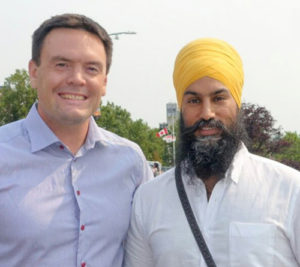
Thursday, January 25 ~ OTTAWA – Alistair MacGregor, MP (Cowichan-Malahat-Langford) has been named as the Agriculture Critic in the NDP Shadow Cabinet. The appointment was announced today in Ottawa by NDP Leader Jagmeet Singh.
In this role MacGregor will also be appointed as the Vice-Chair of the House of Commons Standing Committee on Agriculture and Agri-Food.
“As someone who owns a small-scale farm property in the Cowichan Valley on Vancouver Island, I am excited to accept this appointment to serve as the NDP’s Agriculture Critic,” said MacGregor.
“The issues surrounding how we produce and consume our food are always on the forefront of the national conversation, and I am looking forward to leading the development of NDP policy on these matters and holding the government to account,” added MacGregor.
“Agricultural producers are among the most important actors in the Canadian economy, and I will make sure their voices are heard in Parliament.”
The appointment was announced today at the NDP Caucus Retreat in Ottawa. MacGregor previously served as the NDP’s Critic for Justice and Attorney General and for Seniors.
MacGregor maintains two constituency offices within the broad geographical region of Cowichan-Malahat-Langford — one in Duncan, and one in Langford.
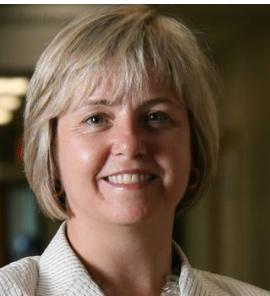
Wednesday, January 24 ~ Deputy provincial health officer Dr. Bonnie Henry has been appointed as BC’s new provincial health officer (PHO). She will replace Dr. Perry Kendall, who will retire on Jan. 31, 2018.
Health Minister Adrian Dix made the announcement to media today, including that Dr Henry is the first woman to hold that position in BC.
Dr Henry says she will contribute independent, evidence-based advice including on the overdose crisis, legalization of cannabis, and drinking water. She said there is still work to do around communicable diseases and acknowledged that British Columbians “are in the middle of a bad influenza season right now”.
Dr Henry has concerns about co-locating cannabis and alcohol in the same provincial liquor-store outlets “and impacts that might have”. “We have expressed that but it’s up to others to make decisions,” she said.
The incoming Public Health Officer says that under Dr Perry Kendall BC has “led the country” in recognizing the overdose crisis and that “a myriad of different measures to try and keep people alive” have been implemented. Dr Henry says the focus is on communities “and what we can do with their unique needs”.
She says progress will be about “building a system that will support people where they are in their journey”. She articulated that pain can be psycho-social, emotional or physical and that it’s not easy to change a chronic relapsing condition under such scenarios.
Providing a safer drug supply is part of the solution, Dr Henry said. The drugs are “toxic and killing people”. She feels strongly about not criminalizing people who use drugs and instead focusing on “helping them wherever they are”.
Today Dr Perry Kendall — who has been BC’s Public Health Officer since 1999 — thanked media for continuing to report factual stories and getting the message out properly in a new world of ‘fake news’.

Tuesday, January 23 ~ WEST COAST / VANCOUVER ISLAND. An 8.1 Earthquake has occurred south of Alaska at 01:32am. As of 4:12 am the TSUNAMI WARNING WAS CANCELLED: https://www.emergencyinfobc.gov.bc.ca/tsunami-warning-coastal-areas-of-bc-jan-23-2018-at-0135am/
==== Previous post:A Tsunami Warning has been issued for all coastal areas of British Columbia. It is believed the waves generated may impact low lying areas under 20 metres.
Follow the instructions of authorities in your area. Do not call police or 911 for updates. Visit Emergency Preparedness and municipal websites as well as Twitter for updates.Minimize phone use in affected areas. For further information go to the emergency management British Columbia website at https://www.emergencyinfobc.gov.bc.ca/
No evacuations for Sooke are ordered at this time, says Sooke Fire Rescue. Fire crews are patrolling Whiffin Spit (CLOSED) and Billings Spit.District of Tofino has advised residents to evacuate to higher ground.
The tsunami is expected to arrive at Tofino at 4:40 am Pacific Time. See Twitter: @TofinoCA
Metchosin Fire Chief Stephanie Dunlop emailed out “this is not a drill”.
The National Tsunami Warning Center has issued a tsunami warning that includes the following zones of coastal British Columbia:• Zone A – the North Coast and Haida Gwaii.• Zone B – the Central Coast and Northwest Vancouver Island Coast, including Kitimat, Bella Coola and Port Hardy.• Zone C – the Outer West Coast of Vancouver Island from Cape Scott to Port Renfrew.• Zone D – the Juan de Fuca Strait from Jordan River to Greater Victoria, including the Saanich Peninsula.“
At this time it is believed that a tsunami has been generated. The tsunami may impact low lying coastal areas in these zones. Local governments in these zones are urged to activate their emergency plans and immediately begin evacuation of identified areas at risk for tsunami impacts,” said Chief Dunlop.
No other zones of coastal British Columbia are at risk.The Township of Esquimalt is monitoring the tsunami warning situation and are setting up a reception centre in case evacuation is necessary – details to follow.
Saturday, January 20 ~ VANCOUVER. Premier, ministers depart for Asia to strengthen relationships, create good jobs in BC. BC Premier John Horgan departed today to Guangzhou, China, as part of a 10-day mission to China, South Korea and Japan to strengthen economic and cultural ties with three of BC’s largest trading partners, expand markets, and create good jobs for people throughout BC.
Premier Horgan will promote bilateral relationships between British Columbia and key government and business leaders. The Premier will be accompanied by Minister of Jobs, Trade and Technology Bruce Ralston and Minister of State for Trade George Chow. Minister of Tourism, Arts and Culture Lisa Beare will participate in the China portion of the mission to foster tourism opportunities in support of the 2018 Canada-China Year of Tourism.
The agenda includes bilateral meetings to advance collaboration with BC’s sister provinces, Guangdong, China and Gyeonggi, Korea. Other meetings and events will focus on opening up investment and trade opportunities in key sectors, including tourism, low-carbon and clean technology, forestry, energy, mining, innovation and tech, agrifoods, seafood, and arts and culture.
China, Japan and South Korea are BC’s second-, third- and fourth-largest trading partners, respectively. Developing strong business relationships in priority markets around the world is a key strategy in government’s commitment to building a strong, sustainable economy.
Travel Itinerary: * Jan. 20 – Depart from Vancouver * Jan. 21 – Guangzhou, China * Jan. 23 – Beijing, China * Jan. 25 – Seoul, South Korea * Jan. 27 – Tokyo, Japan
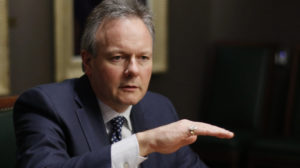
Thursday, January 18 ~ NATIONAL. The Bank of Canada’s increase in their benchmark interest rate to 1.25% (from 1%) follows two increases of .25% that were implemented in summer/fall 2017.
The bank rate is usually moved upwards as a mechanism to control or contain an inflationary market. The new rate of 1.25% is the highest level in Canada since 2009.
As of Thursday, January 18, all five big banks (TD, Scotia, BMO, RBC and CIBC) now have the same prime lending rate of 3.45%. Prior to the Bank of Canada’s move, their rates were all 3.2%.
While job numbers were apparently strong in the latter part of 2017, that data appears not to have been fully explored for job quality (i.e. part time / full time / level of benefits) and may include a wave of seasonal hiring ahead of the Christmas retail season.
In the fall of 2017 — with the anticipated impact of the mortgage stress test that is now in place (as of January 1 2018) — there began a ‘rush on the bank’, if you will. People locked into low-rate and fixed-rate mortgages and/or buying properties at all. The lower end of the market was squeezed — fewer entry level buyers were qualifying, and owners of lower-end properties were challenged to find available buyers.
The level of household debt in Canada is at its highest level ever seen, sitting at 171.1% as of the 3rd Quarter. That includes mortgages, lines of credit and credit card debt.
So while “savers will benefit” (i.e. people who already have money set aside), most of the rest of the middle class, workers and consumers will be further hard pressed to maintain lines of credit and pay down mortgages and credit cards.
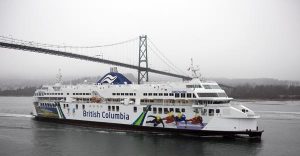 Thursday, January 18 ~ COASTAL BC. BC Ferries vessels and terminals will become a smoke-free environment starting January 22, 2018. This policy change was first announced last summer.
Thursday, January 18 ~ COASTAL BC. BC Ferries vessels and terminals will become a smoke-free environment starting January 22, 2018. This policy change was first announced last summer.
The coastal transportation provider says it is introducing a smoke-free environment to support the health and wellness of customers and employees.
The new policy applies to the smoking of tobacco and any other substance, including the use of e-cigarettes. All vessels and terminal properties will become smoke and vape-free environments, including the interior of all vehicles that are on BC Ferries property.
BC Ferries says it has received many requests from customers to offer a smoke-free environment.

Thursday, January 18 ~ LANGFORD. Only one Canadian city is among the top 20 finalists in the highly sought-after prize of being the location for Amazon’s Thunderdome (its second headquarters or HQ2), and that’s Toronto.
Bids were received by Amazon from 238 cities across North America. Here in BC, a bid had been submitted by Vancouver and the growing City of Langford on Vancouver Island. In Alberta, Calgary had also shown interest by submitting a bid.
Of the other 19 cities on the shortlist, many are clustered on the eastern seaboard of the US or in America’s midland heartland, with only one on the west coast:• Atlanta, GA• Austin, TX• Boston, MA• Chicago, IL• Columbus, OH• Dallas, TX• Denver, CO• Indianapolis, IN• Los Angeles, CA• Miami, FL• Montgomery County, MD• Nashville, TN• Newark, NJ• New York City, NY• Northern Virginia, VA• Philadelphia, PA• Pittsburgh, PA• Raleigh, NC• Toronto, ON• Washington DC
It was one of Amazon’s goals to build its second headquarters some distance away from its original Seattle headquarters, which as a different shipping location would reduce distance and time for many deliveries. As well, the ‘elephant in the room’ is that Seattle is smack dab within the west coast earthquake zone.
Amazon has said it will work with each city to “dive deeper into their proposals, request additional information, and evaluate the feasibility of a future partnership that can accommodate the company’s hiring plans as well as benefit its employees and the local community.”
The selected candidates will move to the next round of Amazon’s selection process, the company said today, January 18. Amazon says it will make a final decision on the site of its new headquarters this year.
“Getting from 238 to 20 was very tough — all the proposals showed tremendous enthusiasm and creativity,” said Holly Sullivan, Amazon’s head of economic development. “Through this process we learned about many new communities across North America that we will consider as locations for future infrastructure investment and job creation.”
Amazon provided little detail about how it picked the finalists for its second headquarters, which it is calling HQ2, other than to say it based it choices on the criteria it laid out for the search earlier.
As reported by the New York Times, the H2Q bidding process has also attracted critics. They quote Stacy Mitchell, co-director of the Institute for Local Self-Reliance, a nonprofit organization that serves as an advocate for local businesses, who said that local politicians were enhancing Amazon’s image just as the company’s market power was under growing scrutiny from groups like her own. “As these cities woo and grovel, they are basically communicating this idea that we should want Amazon to be bigger and more powerful in our economy,” Ms. Mitchell said.
Other critics have said the magnitude of Amazon in any given city would displace smaller businesses in part by drawing away talent to the mega-Amazon. Whatever city gets the prized HQ2 contract will probably see an additional burden on municipal taxpayers for things like more roads and other infrastructure and require a larger system of services including housing, retail and medical. Likely appreciating this, Amazon did specify in the bid criteria that potential locations should have a population of at least 1 million, so that knock-on impacts could be absorbed.
Tuesday, January 16 ~ BC. Premier John Horgan will help kick off the 2018 Mining for Miracles campaign in support of the BC Children’s Hospital Foundation with an announcement being held at 2:45 pm at the Prince George Civic Centre in Prince George on Wednesday January 17.
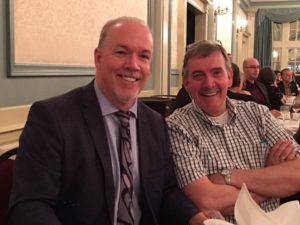
Thursday, January 11 ~ VICTORIA. BC Premier John Horgan is “very much in family mode this week”, upon the passing of his oldest brother, Pat Horgan on January 6.
The Premier’s office announced the news today, January 11: “It’s with great sadness that we announce that Pat Horgan, Premier John Horgan’s brother, passed away on Saturday, January, 6, 2018. Pat passed away from cancer at the age of 71. He will be deeply missed by his family and friends.”
A service will be held in Pat’s home community of Port McNeill on February 10, 2018. In lieu of flowers, donations can be made to the BC Cancer Agency in support of lung cancer research. Messages to the family can be sent by email to: shirpath04@gmail.com
According to the Premier’s staff, John Horgan, 58, looked up to brother Pat Horgan as a father figure. John Horgan has another brother and a sister. His mom passed away about nine years ago. John Horgan was born in Victoria, the son of Pat and Alice Horgan, who had four children. Horgan has been heard to say that he has no memories of his father, who died when Horgan was quite young. But based on stories from his family, he apparently takes a lot after his dad.
John Horgan has been the MLA for what is now the Langford-Juan de Fuca riding (including Sooke), since 2005.
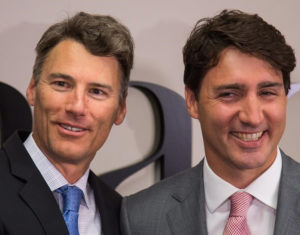
Wednesday, January 10 ~ BC. Three-term Vancouver Mayor Gregor Robertson announced today that he will not be seeking reelection in the October 2018 municipal election.
Robertson has left a strong footprint with his work in climate change, transportation and housing concerns in Canada’s western-most major metropolis. He was the only Canadian mayor invited to discuss climate change with the Pope in Vatican City in July 2015.
Having held the position of mayor for 10 years, Robertson today described his decision as ‘intensely personal’ and says he will not continue in politics. “An important part of leadership is to know when to make space for new voices and leaders,” he said from Vancouver City Hall today.
In a lengthy statement posted on Facebook, Robertson included that Vancouver has led the national effort to fight for health-focused drug policy and saving lives in the opioid overdose crisis.
In response to this news today, BC Premier John Horgan released the following statement about Vancouver Mayor Gregor Robertson’s decision to not seek re-election in 2018: “I have known Gregor Robertson for many years. He was a trusted colleague when we worked together as MLAs in Victoria, and he is a valued partner as we work with local governments to make life better for people. From transit and transportation, to housing and homelessness, Gregor has been a passionate advocate for people. He can be proud of the work he and council have done to make Vancouver the greenest city in the world. On behalf of British Columbians, I want to thank Gregor for his many years of public service and wish him well in his future endeavors.”
Prime Minister Justin Trudeau tweeted today: “Thanks, @MayorGregor, for your friendship, partnership, and years of service & work for people in Vancouver. Wishing you all the best.”
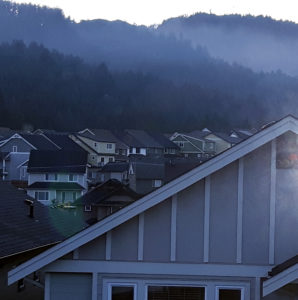 Wednesday, January 3 ~ VICTORIA. The BC Government is raising the 2018 homeowner grant threshold to $1.65 million, ensuring the same percentage of British Columbia homes are below the threshold as in 2017. That percentage was about 91% in 2017.
Wednesday, January 3 ~ VICTORIA. The BC Government is raising the 2018 homeowner grant threshold to $1.65 million, ensuring the same percentage of British Columbia homes are below the threshold as in 2017. That percentage was about 91% in 2017.
The increase is one very firm indicator of how much the value of housing has increased in the past year (in 2017 the threshold was $1.6 million, which jumped from the level of $1.2 million in 2016).
Eligible homeowners must apply for the homeowner grant each year. To be eligible for a grant, the home must be used as the owner’s principal residence. The homeowner grant is automatically calculated on a homeowner’s property tax notice.
The homeowner grant amounts are: $570 for the basic homeowner grant | $770 if the home is located in a northern or rural area | Up to $845 for homeowners who are 65 years or older, or the homeowner is a person with a disability. | Up to $1,045 for homeowners who are 65 years or older, or the homeowner is a person with a disability if the home is in a northern or rural area.
Some low-income owners, such as seniors or people with disabilities, can apply to supplement their homeowner grant if it has been reduced or eliminated because of the high assessed value of their principal residence. Homeowners may also be eligible for property tax deferment if they are 55 years or older, or are financially supporting a dependent child.
Homeowner grants will return an estimated $825 million to British Columbians this year. The Province reimburses municipalities for the full cost of the homeowner grant to make sure municipal revenues are not affected. In the majority of BC communities, almost every home is valued below the threshold.
Home Owner Grants: https://www2.gov.bc.ca/gov/content/taxes/property-taxes/annual-property-tax/reduce/home-owner-grant
To apply for low-income grant supplement: https://www2.gov.bc.ca/gov/content/taxes/property-taxes/annual-property-tax/reduce/home-owner-grant/senior/low-income
Qualification for property tax deferment: https://www2.gov.bc.ca/gov/content/taxes/property-taxes/annual-property-tax/defer-taxes
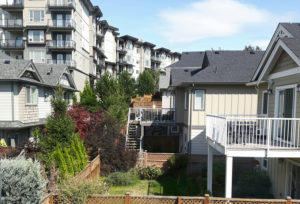
In general, over the years, standards in the BC Building Code have become increasingly strident or strict. In many cases this has added to the cost of new housing construction and therefore the ticket price of homes new homes available for sale.
While builders and those in and around the construction industry are usually the main providers of feedback, there is room for consumers to have their say.
Building Code topics for input include Accessibility, Area Calculation of Exposing Building Face, Asbestos, Energy Efficiency Standards, Exit Signs, Factory-Constructed Buildings, Fenestration (windows), Heritage Buildings, Mid-Rise Combustible Construction, Outdoor Design Conditions and Air Cleaning, Radon, Stairs (dimensions of tapered treads, handrails in curved stairs, no spiral stairs).
> BC Plumbing Code topics for input include Asbestos, and Plumbing Fixtures.
> BC Fire Code topics for input include fire systems, emergency lighting, smoke alarms and use of elevators.
The current BC Building, Plumbing and Fire Codes came into effect December 20, 2012.
Back to the Current BC & NATIONAL Breaking News page | Back to the Main Page of this WSV website

